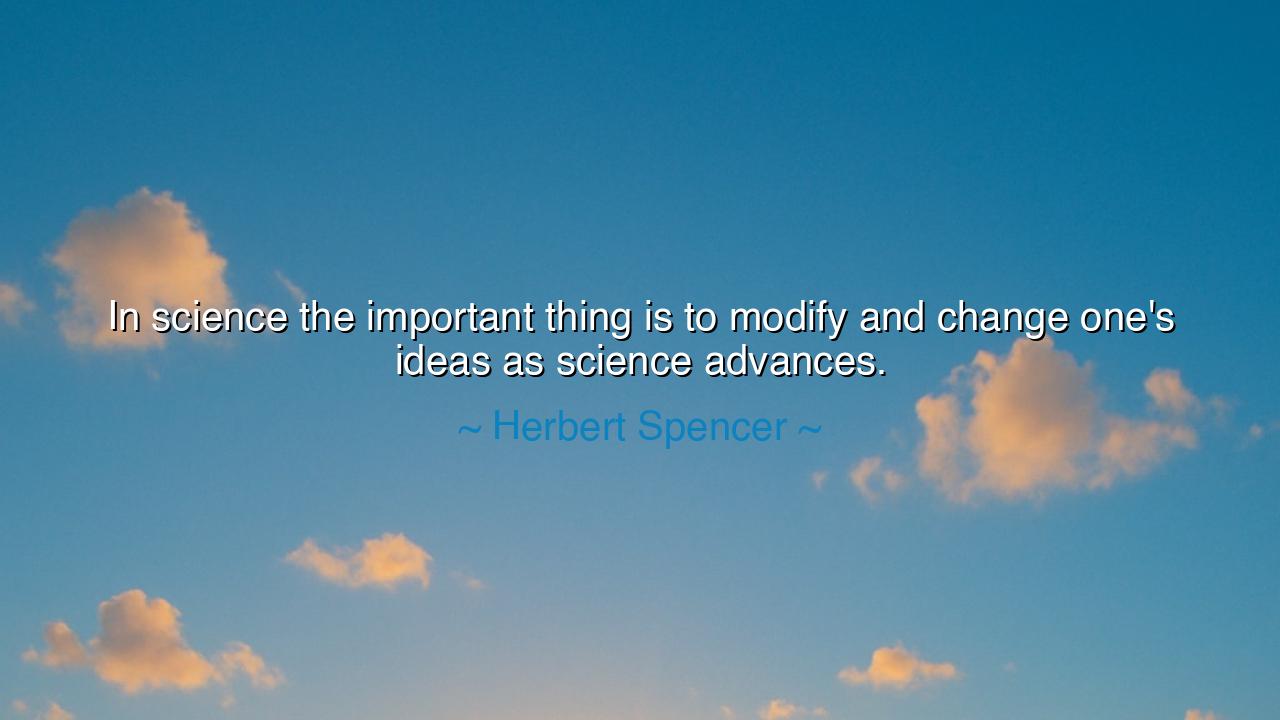
In science the important thing is to modify and change one's
In science the important thing is to modify and change one's ideas as science advances.






Hear now, O children of wisdom, the words of Herbert Spencer, a sage whose insights illuminate the path of intellectual growth and the pursuit of truth. He declared, "In science the important thing is to modify and change one's ideas as science advances." These words carry with them a deep lesson—that in the quest for knowledge, the mind must remain fluid, ever-ready to evolve as new truths come to light. To hold rigidly to our ideas is to block the flow of progress. The essence of science, Spencer reminds us, lies in the constant transformation of thought, in the willingness to adapt, and in the courage to embrace change when the evidence demands it.
The ancient philosophers, those early seekers of truth, understood that knowledge was a living thing, a process of discovery rather than a final destination. Socrates spoke of the unexamined life, urging those who would seek wisdom to always question and reassess their beliefs. The pursuit of knowledge is not a pursuit of certainty, but of truth, and that truth can only be uncovered through the continuous modification of our ideas. The path of the philosopher is not one of stubborn certainty, but of continual evolution—a journey where every new discovery leads to the refinement of thought and a greater understanding of the world.
Consider the story of Galileo Galilei, a man who, in his search for the truth of the heavens, dared to challenge the prevailing beliefs of his time. In the face of opposition, Galileo modified his views, adopting the heliocentric model of the solar system after observing the movements of the planets through his telescope. The evidence led him to change his ideas—his faith in science allowed him to embrace a new truth, even when it clashed with the established doctrines of the Church. Galileo’s willingness to modify his ideas in the face of new evidence forever altered our understanding of the universe, and his story stands as a testament to the power of change in the pursuit of truth.
The ancient scientists knew well the importance of evolving their ideas as knowledge advanced. Consider Aristotle, whose theories in many fields—from physics to biology—dominated the thinking of Western thought for centuries. Yet, as time progressed and the scientific method took hold, Aristotle’s ideas were modified, refined, and in some cases, replaced by newer models. Newton, for example, modified the work of Kepler and Galileo, introducing his own laws of motion and gravity, which were then refined further by Einstein centuries later. This endless cycle of modification, of revised understanding, is the very essence of science—a pursuit not of immutable truths, but of ever-evolving knowledge.
Spencer’s words remind us that the pursuit of science is not a destination, but a journey—one that requires humility and a willingness to evolve. It is a recognition that truth is not static, but dynamic, and that as our understanding grows, so too must our ideas. This lesson is especially important in our own time, where knowledge and technology advance at an ever-quickening pace. We must remain open to change, even when it challenges the very foundations upon which we’ve built our understanding. The scientific community thrives not because it clings to certainty, but because it is ever willing to question, to test, and to adapt. It is through this adaptability that science progresses and that humanity moves closer to understanding the mysteries of existence.
In your own life, O children, remember the lesson of Herbert Spencer. Be willing to modify your ideas when new evidence presents itself, even if it means letting go of beliefs you’ve held for years. Just as Galileo had the courage to abandon the conventional wisdom of his time, so too must you have the courage to evolve, to grow, and to learn. The pursuit of truth is not about being right, but about being willing to listen to the evidence and to change your mind when necessary. The truth does not fear change, for it is not an enemy of progress but its ally.
As you venture forward on your journey of discovery, be ever open to modification. When faced with new knowledge, do not resist it out of pride or fear, but embrace it as an opportunity to become wiser, more complete. Whether in science, in philosophy, or in your own life, remember that the most powerful force is not certainty, but flexibility—the ability to change in the face of new understanding, to adapt when the world reveals something deeper, truer, and more profound. In this way, you will continue the noble tradition of those who have shaped the world through their willingness to modify and advance their ideas in pursuit of the truth.






AAdministratorAdministrator
Welcome, honored guests. Please leave a comment, we will respond soon